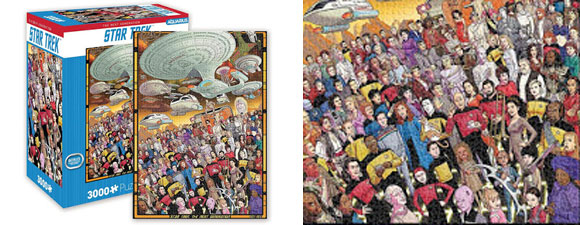Retro Review: Sub Rosa
8 min readAfter attending her grandmother’s funeral, Crusher falls under the spell of the 100-year-old woman’s much younger lover.
Plot Summary: Beverly Crusher speaks at the funeral of her grandmother, Felisa Howard, who died on Caldos IV, where she was a healer in a colony designed to look like a Scottish village. After the service, Crusher sees a man younger than herself place a flower in the grave. Later, when reading her Nana’s diary, Crusher discovers that the centenarian had a lover in his 30s. However, a villager named Ned warns her that Nana’s house is haunted and demands that she never light the heirloom candle she wants to take back to the Enterprise. That night, Crusher hears a disembodied voice in her quarters and feels invisible hands touching her. Returning to the village, she searches for her grandmother’s young lover, Ronin, though Troi warns that sometimes grieving people come together for the wrong reasons. While Crusher finds her grandmother’s house filled with flowers and meets Ronin, who tells her that he is a centuries-old ghost who has loved generations of Howard women, LaForge and Data discover that the colony’s weather systems are malfunctioning due to power fluctuations. When they beam down, they find Ned trying to shut off the weather grid and witness his death by a plasma overload. During the autopsy, Crusher discovers an energy signature in Ned’s cells that matches the weather disturbance, but she is distracted, for she has fallen in love with Ronin, who makes her feel pleasure by entering her body in the form of an energy discharge. She tells Picard that she plans to resign from Starfleet and take over her grandmother’s career on Caldos IV. Picard and Troi both worry at the sudden change in Crusher’s behavior as well as the fact that her eyes have turned green, like her grandmother’s. Picard beams down to meet Ronin and finds Beverly very much changed, though when Ronin attacks Picard for asking too many questions, she insists on saving him. Meanwhile, Data and LaForge discover the energy disrupting the weather systems emanating from Felisa Howard’s body, and Ronin goes to stop them from exhuming her. Howard sits up in her coffin to attack the crewmen, using the same energy Ronin used to attack Picard, but Crusher witnesses the fight and orders Ronin to stop. She has realized that he is an anaphasic life form who needs a host, so he has been using the women of her family. The candle is the receptacle for his energy, and when she destroys it, she is able to vaporize Ronin. Picard, Data, and LaForge all recover, but Crusher tells Troi that she is still grieving for what she had thought was an idyllic love.
Analysis: Disclaimer: Although I loved her Vampire Chronicles, I hated Anne Rice’s Mayfair witch story, of which “Sub Rosa” is a shameless ripoff except that in this case the “ghost” is an alien. Yes, I know Jeri Taylor claims that the story was inspired by The Turn of the Screw, but I don’t believe for one second that none of the writers had read The Witching Hour. It irritates me when Taylor – the senior female writer and producer of Star Trek at the time – claims to have been doing female viewers a favor, pointing at us as the ostensible audience for stereotypical romance-novel slush. This is one of many instances where Trek producers have made statements suggesting that any cliched formula for romance should make women happy (another choice example being Voyager‘s “Unforgettable,” in which Chakotay falls in love with and forgets Virginia Madsen in the space of a single episode), and I would like to raise my hand as a female viewer who’d rather have no romance at all than this trashy stuff that I’m supposed to be thankful for. Brannon Braga, who wrote the teleplay from Taylor’s story, has blamed the erotic elements of the episode for the fact that most fans don’t like it, implying that Trekkies just can’t handle sex, so let me add that my issue is not at all with sexuality in the abstract. If Braga had written an episode where Picard caught Crusher masturbating without an evil alien having to possess her first, it would have been fine with me. The staff loves to blame the fans for the fact that they wrote stilted relationships on the series, but did it never occur to them that by implying that Crusher can only really get off when some alien influence makes her let her hair down, they’re the ones who seem to have serious issues with how female sexuality is expressed? Why couldn’t we have seen aching-for-it Beverly Crusher in “Attached” when she and Picard were joined at the brain and she was looking into his thoughts while he was having pornographic dreams about her?
The always-lovely Gates McFadden gives her least convincing performance in “Sub Rosa,” which is actually my favorite thing about the episode. She looks as embarrassed to be there as I feel watching it, particularly during the fake-orgasms-while-being-invaded-by-an-energy-being scenes. For contrast, watch Nana Visitor’s performance during the scene in “Chimera” when Odo makes love to Kira for the first time as a changeling rather than a humanoid, which is so beautiful it makes me cry. But then, Odo and Kira’s romance is the culmination of many years of intense feeling and conflict and struggle…a real relationship, something none of Trek’s writers seems to take for granted as a necessary component of a satisfying love affair. I know that McFadden is capable of similar conviction and subtlety, but what we get here is soft-core showing off for the camera, not anything that looks like true passion. The writers could have saved “Sub Rosa” by shifting the emphasis to the relationship in which they’ve already given viewers a long investment – the relationship between Crusher and Picard, which is strongly in viewers’ minds since “Attached” was so recent – but they opt instead for the tears and tantrums that are the staples of formulaic romance novels, though completely out of character for Beverly Crusher. Deanna Troi doesn’t notice at first because Troi is the worst counselor ever in this storyline, leaving Crusher alone when the latter clearly wants to talk about her grandmother, failing to follow up on discussing the powerful erotic feelings that allow Crusher to put off grieving for the woman who raised her after her mother’s death.
With so little emotional support, no wonder Crusher would rather hang out with a sexy ghost. It’s not fair to her, but it’s also not fair to us…this is the most information we’ve ever had about Crusher’s girlhood, the fact that she was raised by a grandmother who inspired her to be a doctor, though the grandmother apparently preferred to live in a Renaissance Faire historical setting rather than in the futuristic world of the Federation and Crusher hadn’t seen her in nearly two decades, which I guess means she never bothered to introduce Wesley to his great-grandmother. I suppose that’s why she didn’t mention Wesley at the funeral, and didn’t worry about his future when she decided abruptly to resign from Starfleet, though neither Picard nor Troi mentions him to her either, for all their concern about how much Beverly has changed. This is sloppy characterization of the same sort as dropping a brother from the sky in on Worf last week and declaring that this newly inserted character is of enormous importance to the main character’s childhood. After six and a half seasons, we should either have heard more about these people or they shouldn’t be described as enormous influences on the main characters’ lives. Then there’s the fact that Crusher willingly enters into a sexual relationship with a man who was the lover of her grandmother and great-grandmother before her, which is just plain creepy. There are all sorts of indications in this seventh season that Next Gen‘s writers had run out of ideas and were tossing random themes and plots around to fill time.
Ah well. My second favorite thing about “Sub Rosa” is the conceit of a Scottish town recreated on an alien world, and the look of the episode, at least, is wonderful. Caldos IV has been terraformed to look like the Scottish Highlands, and we’re told that many of the buildings in the town are built from stones brought from Aberdeen. It’s very different from any other Star Trek set, the folk themes in the music are a delightful surprise, and the funeral at the beginning – with religious language that probably makes Gene Roddenberry roll over in his grave – is one of the most believable ceremonies ever depicted on a show that loves to make up futuristic weddings, memorial services, etc. Plus the ghost is pretty sexy when he’s in humanoid form, though we only get to see Crusher really hot for him when he’s a green energy being, which is a shame; I’m glad Trek’s casting directors brought Duncan Regehr back to play Shakaar on Deep Space Nine, though I preferred him as Winn’s adversary than Kira’s boyfriend. I wish the rest of the townspeople in “Sub Rosa” were less cliched, from the alien-born governor who wants to be a Scotsman to the gruff Highlander who warns Crusher that there’s a ghost affecting the weather and has to be reminded that he knows perfectly well the weather is generated by computer. (And I can’t believe that in an episode with allusions to Macbeth, no one gets in a single mention of Star Trek’s most famous Scotsman, the engineer of the original Enterprise.)
The subtle misogyny built into so much commercial romance, even romance by women for women, is at play all over “Sub Rosa.” Ronin seduces Crusher by telling her that he’s going to become part of her and take care of her, and she will always feel loved like her grandmother and great-grandmother before her – this is before she’s had Ronin enter her as a green mist, so she’s making a conscious decision at this point to allow him such control. Ned the stereotypical Scotsman says Howard women are always the same fools and I want to argue with him, but no one in the episode, not even Crusher, ever points out that what Ronin did to her and the women in her family is akin to drugging and violating them (I won’t use the word “rape” because we see Crusher make the choice to let the alien inside her body, choosing as well not to find out who or what he is beforehand). I hate that in the end, she’s mainly sad about the fact that her Nana seems to have been very happy under the mind control of a manipulative alien rather than having any of a long list of emotions I could believe a woman might have to learning that her grandmother’s lover had taken advantage of her, physically and emotionally. I find it absurd that she’s completely back to normal within days in TV time, but I also prefer it that way, because it enables me to write “Sub Rosa” off as not real. Otherwise, are we to understand that the root of all bad Gothic romance is a species of alien that preys on human women? Lestat and Edward Cullen both give women more credit than “Sub Rosa” does.






